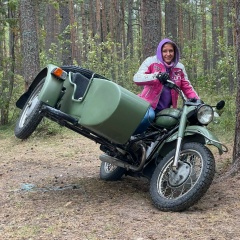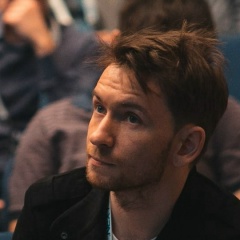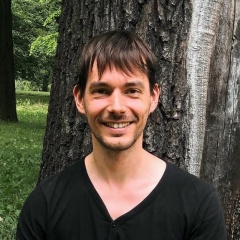Ох, я же тут читаю! Вы слышите? #Калянычъ_читает!
Я давно ленился писать, так что сейчас кучу всего накидаю, что вспомню. Напишу по чуть-чуть, ну а если что, спрашивайте.
- «Библиотекарь» (Михаил Елизаров)
Я долго думал, как эту книгу обозвать и решил, что это (пост)советский магический реализм. Без подражания Борхесу и Маркесу, но какая-то общность чувствуется. Очень круто.
- «Bloodlands: Europe Between Hitler and Stalin» (Timothy Snyder)
Немножко (на самом деле, множко) нелицеприятной истории Восточной Европы. Хотя местами тенденциозность ощущается.
- «Harry Potter and the Methods of Rationality» (Eliezer Yudkowsky)
Это… Это такой странный фанфик. А что будет, если ГП принесёт в Хогварц научный метод?
- «Fluke, or, I Know Why the Winged Whale Sings» (Christopher Moore)
Её мне было рекомендовано прочитать руководством китоведческой экспедиции. Я был уверен, что это какой-то научпоп, пока на первой же странице речь не зашла о ягодицах коллеги главного героя (*каламбур про науч_поп_*). Дальше было только хуже. В хорошем смысле.
- «В якутской тайге» (Янис Строд)
- «Зимняя дорога» (Леонид Юзефович)
Это две книги об одном довольно-таки малозначительном и не шибко известном эпизоде Гражданской войны (в широком смысле). Первая — воспоминания участника, красного командира. Вторая — историческая повесть о самом эпизоде, его предпосылках, участниках и т.д.
- «Древние чудовища России» (Антон Нелихов, с иллюстрациями Андрея Атучина)
Патриотическая палеонтология в картинках. Научпопом назвать сложно, уровень всё-таки весьма школьного возраста, но много любопытного… И картинки!
- «Объясняя религию. Природа религиозного мышления» (Паскаль Буайе)
Ну тут вроде всё понятно. Антропологический научпоп. Солидно, убедительно, доказательно. Рекомендую всем и каждому.
- «Загадка Прометея» (Лайош Мештерхази)
Книженция, подвигшая К. Еськова на «Евангелие от Афрания». Околоисторическое рассуждение. Неплохо, но пожиже, чем «Евангелие…».
- «Глазами физика. От края радуги к границе времени» (Уолтер Левин)
Книженция известного своими лекциями физика, показывающая красоту законов, описывающих мир и прочую Вселенную. Надо будет его лекции послушать, а то материал 10-11 классов у меня в голове как-то мало следа оставил, к стыду моему.
- «Статистика и котики» (Владимир Савельев)
Почти случайно попалась под руку. Впечатления остались неоднозначные: такое впечатление, что я слишком хорошо знаю статистику для неё (что меня сильно удивило). Формул мало, котиков много. Из-за этого получается, как ни странно, не очень понятно. ЦА — панически боящиеся статистики люди, желающие бесстрашно выбирать магические пункты в меню статистических пакетов.
Я давно ленился писать, так что сейчас кучу всего накидаю, что вспомню. Напишу по чуть-чуть, ну а если что, спрашивайте.
- «Библиотекарь» (Михаил Елизаров)
Я долго думал, как эту книгу обозвать и решил, что это (пост)советский магический реализм. Без подражания Борхесу и Маркесу, но какая-то общность чувствуется. Очень круто.
- «Bloodlands: Europe Between Hitler and Stalin» (Timothy Snyder)
Немножко (на самом деле, множко) нелицеприятной истории Восточной Европы. Хотя местами тенденциозность ощущается.
- «Harry Potter and the Methods of Rationality» (Eliezer Yudkowsky)
Это… Это такой странный фанфик. А что будет, если ГП принесёт в Хогварц научный метод?
- «Fluke, or, I Know Why the Winged Whale Sings» (Christopher Moore)
Её мне было рекомендовано прочитать руководством китоведческой экспедиции. Я был уверен, что это какой-то научпоп, пока на первой же странице речь не зашла о ягодицах коллеги главного героя (*каламбур про науч_поп_*). Дальше было только хуже. В хорошем смысле.
- «В якутской тайге» (Янис Строд)
- «Зимняя дорога» (Леонид Юзефович)
Это две книги об одном довольно-таки малозначительном и не шибко известном эпизоде Гражданской войны (в широком смысле). Первая — воспоминания участника, красного командира. Вторая — историческая повесть о самом эпизоде, его предпосылках, участниках и т.д.
- «Древние чудовища России» (Антон Нелихов, с иллюстрациями Андрея Атучина)
Патриотическая палеонтология в картинках. Научпопом назвать сложно, уровень всё-таки весьма школьного возраста, но много любопытного… И картинки!
- «Объясняя религию. Природа религиозного мышления» (Паскаль Буайе)
Ну тут вроде всё понятно. Антропологический научпоп. Солидно, убедительно, доказательно. Рекомендую всем и каждому.
- «Загадка Прометея» (Лайош Мештерхази)
Книженция, подвигшая К. Еськова на «Евангелие от Афрания». Околоисторическое рассуждение. Неплохо, но пожиже, чем «Евангелие…».
- «Глазами физика. От края радуги к границе времени» (Уолтер Левин)
Книженция известного своими лекциями физика, показывающая красоту законов, описывающих мир и прочую Вселенную. Надо будет его лекции послушать, а то материал 10-11 классов у меня в голове как-то мало следа оставил, к стыду моему.
- «Статистика и котики» (Владимир Савельев)
Почти случайно попалась под руку. Впечатления остались неоднозначные: такое впечатление, что я слишком хорошо знаю статистику для неё (что меня сильно удивило). Формул мало, котиков много. Из-за этого получается, как ни странно, не очень понятно. ЦА — панически боящиеся статистики люди, желающие бесстрашно выбирать магические пункты в меню статистических пакетов.
Oh, I'm reading here! You hear? #Kalyanych_read!
I have been too lazy to write for a long time, so now I’m throwing a bunch of everything that I remember. I’ll write a little bit, but if anything, ask.
- “Librarian” (Mikhail Elizarov)
I thought for a long time how to call this book and decided that it was (post) Soviet magic realism. Without imitation of Borges and Marquez, but some kind of community is felt. Very cool.
- "Bloodlands: Europe Between Hitler and Stalin" (Timothy Snyder)
A little (in fact, a lot) of the unpleasant history of Eastern Europe. Although in some places bias is felt.
- "Harry Potter and the Methods of Rationality" (Eliezer Yudkowsky)
This ... This is such a weird fan fiction. But what happens if the GP brings the scientific method to Hogwarts?
- “Fluke, or, I Know Why the Winged Whale Sings” (Christopher Moore)
It was recommended to me to read it by the leadership of the cinema science expedition. I was sure that this was some kind of scientific pop until on the first page we talked about the buttocks of a colleague of the protagonist (* pun about scientific pop *). Further it was only worse. In a good way.
- “In the Yakut taiga” (Janis Strod)
- “Winter Road” (Leonid Yuzefovich)
These are two books about one rather insignificant and not very well-known episode of the Civil War (in the broad sense). The first is the memories of the participant, the red commander. The second is a historical story about the episode itself, its premises, participants, etc.
- “Ancient Monsters of Russia” (Anton Nelikhov, with illustrations by Andrey Atuchin)
Patriotic paleontology in pictures. It is difficult to call a scientific pop, the level is still of a very school age, but there is a lot of curious ... And pictures!
“Explaining religion.” The nature of religious thinking ”(Pascal Buyer)
Well, everything seems to be clear here. Anthropological science. Solid, convincing, evidence. I recommend it to everyone.
- “The Riddle of Prometheus” (Lajos Meshterhazy)
The book of books that inspired K. Yeskova on the "Gospel of Afranius". Near-historical reasoning. Not bad, but thinner than the "Gospel ...".
- “Through the eyes of a physicist. From the edge of the rainbow to the border of time ”(Walter Levin)
A book of books of a physicist known for his lectures, showing the beauty of laws describing the world and the rest of the Universe. It will be necessary to listen to his lectures, otherwise the material of grades 10-11 in my head somehow left little trace, to my shame.
- “Statistics and seals” (Vladimir Savelyev)
Almost by accident I fell into the arm. The impressions were mixed: the impression is that I know the statistics for it too well (which surprised me very much). There are few formulas, many seals. Strange as it may seem, this is not very clear. CAs are people who are panicky afraid of statistics and who want to fearlessly choose magic items in the statistical package menu.
I have been too lazy to write for a long time, so now I’m throwing a bunch of everything that I remember. I’ll write a little bit, but if anything, ask.
- “Librarian” (Mikhail Elizarov)
I thought for a long time how to call this book and decided that it was (post) Soviet magic realism. Without imitation of Borges and Marquez, but some kind of community is felt. Very cool.
- "Bloodlands: Europe Between Hitler and Stalin" (Timothy Snyder)
A little (in fact, a lot) of the unpleasant history of Eastern Europe. Although in some places bias is felt.
- "Harry Potter and the Methods of Rationality" (Eliezer Yudkowsky)
This ... This is such a weird fan fiction. But what happens if the GP brings the scientific method to Hogwarts?
- “Fluke, or, I Know Why the Winged Whale Sings” (Christopher Moore)
It was recommended to me to read it by the leadership of the cinema science expedition. I was sure that this was some kind of scientific pop until on the first page we talked about the buttocks of a colleague of the protagonist (* pun about scientific pop *). Further it was only worse. In a good way.
- “In the Yakut taiga” (Janis Strod)
- “Winter Road” (Leonid Yuzefovich)
These are two books about one rather insignificant and not very well-known episode of the Civil War (in the broad sense). The first is the memories of the participant, the red commander. The second is a historical story about the episode itself, its premises, participants, etc.
- “Ancient Monsters of Russia” (Anton Nelikhov, with illustrations by Andrey Atuchin)
Patriotic paleontology in pictures. It is difficult to call a scientific pop, the level is still of a very school age, but there is a lot of curious ... And pictures!
“Explaining religion.” The nature of religious thinking ”(Pascal Buyer)
Well, everything seems to be clear here. Anthropological science. Solid, convincing, evidence. I recommend it to everyone.
- “The Riddle of Prometheus” (Lajos Meshterhazy)
The book of books that inspired K. Yeskova on the "Gospel of Afranius". Near-historical reasoning. Not bad, but thinner than the "Gospel ...".
- “Through the eyes of a physicist. From the edge of the rainbow to the border of time ”(Walter Levin)
A book of books of a physicist known for his lectures, showing the beauty of laws describing the world and the rest of the Universe. It will be necessary to listen to his lectures, otherwise the material of grades 10-11 in my head somehow left little trace, to my shame.
- “Statistics and seals” (Vladimir Savelyev)
Almost by accident I fell into the arm. The impressions were mixed: the impression is that I know the statistics for it too well (which surprised me very much). There are few formulas, many seals. Strange as it may seem, this is not very clear. CAs are people who are panicky afraid of statistics and who want to fearlessly choose magic items in the statistical package menu.

У записи 15 лайков,
0 репостов,
528 просмотров.
0 репостов,
528 просмотров.
Эту запись оставил(а) на своей стене Николай Шуйский




































